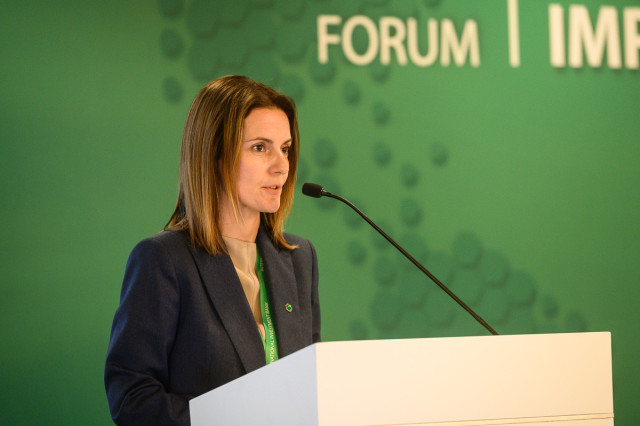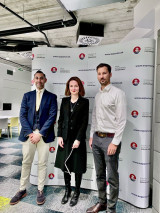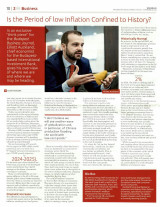Head of IIB International Relations and Communications Anna Lvova talks to Budapest Business Journal about the Bank's integration into the European financial scene

BBJ: The Board of Governors of the IIB voted to relocate the bank from Moscow to Budapest on December 10, 2018, and it became actual with a press conference on June 25, 2019. Has the move achieved all that you wanted?
AL: For our internal purposes, we use April 30, 2019 as an actual date of relocation of IIB Headquarters to Budapest. It’s the date of entry into force of the Host Country Agreement between IIB and Hungary. Hence, we have been in Hungary for exactly one-and-a-half years. As it has been mentioned on numerous occasions before, this decision is a logical continuation of previous shareholder decisions concerning the strategy of the bank and vector of its operations. In the past few years, it became clear that the European angle of things has become dominant. If you look at every pillar of IIB: assets, lending and funding, the share of EU member states in all exceeded 50% some time ago. Thus, a unanimous decision to relocate headquarters in order to be closer to European markets, investors and partners was a natural one. It is also a decision that responds to interests of all shareholders: the trade and economic ties of our outside-EU geographies are rather strong and have a lot of potential for enhancement.
The relocation happened smoothly and in record time. Moreover, the bank did not decrease the pace of its activity for one second throughout the whole process. We were not kept waiting too long for the results that the member states and the team envisaged with the move to demonstrate themselves.
The successful relocation and comprehensive support from shareholders became key factors for long-term credit rating upgrades of the Bank by all major credit rating agencies and currently allow us to enjoy our position of a multilateral development bank with an average “A” rating. It also allowed IIB to place funding at record volumes, at record maturities and at record low interest rates. That, in its turn, has granted the bank an ability to both increase its loan portfolio to a record level and pass on the lower funding costs to the benefit of the clients in our member states. As a result, we are achieving things we strive for as a development finance institution in accordance with our mandate: contribute to economic and social development of our countries, including workplace creation and preservation, environmental protection, integration between economies.
Despite the fact that one-and-a-half years is still early doors with regards to drawing conclusions, it is safe to say that the expectations of the shareholders, as well as of the management board of the bank, are being met. IIB plans to continue its expansion in Europe for the benefit of all member countries and to find its niche among other multilateral development institutions.
BBJ: How has COVID affected the bank's lending in 2020?
AL: By the end of October 2020, the volume of annual disbursements by IIB has already exceeded the same figure for the whole of 2019 by 7% and currently stands at EUR 420 million with almost two more months to go until yearend. Figures show that lending and investment activity continues at full speed, so in that respect COVID hasn’t really affected IIB operations as such. However, if you take a more general view on the matter, you will clearly see that some things had indeed changed, and not only from the point of view of the bank, but also from the clients’ perspective.
In these challenging times and external environment, both financial institutions and companies have had to take a step back and reflect on their approaches to financing and borrowing. When the markets crashed back in the spring, all had to adapt accordingly: we started to take a more cautious approach to new loans and deals, which were already approved and scheduled for disbursements. Some clients also had to reevaluate their borrowing appetites in the light of the crisis. We are proud to say that IIB managed to respond to changing external circumstances in a very efficient manner and continued its day-to-day business activity without any prolapses.
If we look at the specific case of our host country, Hungary, it is evident to us that Hungarian companies were looking at all sorts of possible support in these uneasy times, be it government grants or subsidies or classic bank loans. We felt the demand for our financing and we were open and ready to provide it. As a result, we saw a rather significant increase in the volume of the Hungarian loan portfolio. While at the time of the headquarters’ relocation the share of Hungary in the loan books constituted 6% of the total amount, it currently stands at 15% just above EUR 154 mln, with a number of deals also under consideration in our active pipeline.
The role of multilateral development banks in times of major shocks like COVID cannot be underestimated. They can offer flexibility and additional risk-taking in certain cases, where commercial banks are reluctant to go. They can also offer assistance and partnership to other institutions and government authorities to find the best possible solution for helping business in current turmoil.
BBJ: How does Hungary benefit from having the IIB headquartered in Budapest?
AL: Since rejoining IIB in 2015, Hungary has always been one of the most active member states of the bank. As of today, Budapest is one of the most dynamically growing European capitals with impressive modern infrastructure, highly qualified human resources, and a reasonable cost of living. The Bank has become the first and only multilateral financial institution with the Headquarters in Central and Eastern Europe in general and in Budapest, in particular. In our view, that helps support further positioning of the Hungarian capital as one of the major financial centers of the region.
As we saw in the figures above, Hungary’s loan portfolio with IIB is constantly growing. The bank finds new opportunities to invest into the Hungarian economy from classical lending to the acquisition of sovereign and corporate bonds. Only just this year we became one of the anchor investors into Hungary’s first ever sovereign green bond issue.
In the past year, we have twice issued bonds on the Budapest Stock Exchange in the local currency, stimulating further development of the debt capital market in the country and becoming the first multilateral institution to issue debt instruments in full accordance with Hungarian law.
All these factors are without a doubt beneficial for the country’s economic development and the fact that we enjoy comprehensive support of Hungary as a shareholder (now second largest by share in paid-in capital) speaks volumes about IIB’s impact and the benefits our presence here can offer.
BBJ: One of the goals was to raise the IIB's profile in the CEE region. How have lending levels here changed? Which countries get most money?
AL: One of the things we are particularly proud of at IIB is the level of our loan portfolio diversification from various angles: geography, instruments, clients, sectors of economy. We are often asked whether we consider competition rather strong and harsh in the markets, where we operate and we like to reply that we know how to turn challenges into opportunities. Our bank cannot compete with large institutions, nor do we want to. Our character is quite “boutique” and that, in our view, is one of our major strengths. We offer our clients much-needed flexibility and a tailor-made approach to structuring deals and finding optimal solutions that are mutually beneficial for all parties. Because of a rather compact structure, we are able to finalize some procedures at a faster pace and can offer better staff involvement throughout all stages of project preparation and structuring.
Raising IIB’s profile in the region was indeed one of the goals of relocation and it’s safe to say we are on the right track. Since the first half of 2019, the share of EU countries in the loan portfolio has increased from 52% to 59%. The total loan and documentary portfolio volume broke the EUR 1 billion level at the end of last year for the first time in IIB history.
We have become more visible in the market, receiving invitations to join club deals and syndications for well-known companies, such as Gestamp and Schaeffler. We are able to state our conditions for participation, mostly requiring that our financing is used to support operations in IIB member states.
The bank has broadened the number of its fundraising products, investors and geographies. As of 2020, IIB has issued bonds in the Czech Republic, Hungary, Romania, Russia and Slovakia. We registered our EUR 1.5 bln Medium Term Notes (MTN) Program on the Dublin Stock Exchange and within its framework executed transactions in RON, CZK and HUF. Our investor base in Europe is constantly growing, so market visibility is rather evident. With our average “A” rating, we are viewed as a so-called “safe haven” for investors in these rather challenging times.
BBJ: What are the priority sectors or project themes for the IIB?
AL: Sector diversification in the loan portfolio of IIB is also rather vivid. Our main task is to support priority sectors of our member states’ economies. In our books you will find projects in the energy sector (including renewables), telecom, pharmaceuticals, agriculture and tourism.
In some markets, direct lending is more challenging than in others, so we use local financial intermediaries to support businesses and clients in these particular countries.
A rather compact shareholder structure allows the bank to work in close collaboration with delegations of our member states and to receive timely indications on sector and instrument priorities.
IIB has also demonstrated its role as an integrator, implementing projects that cover the interests of two or more shareholders, promoting economic cooperation between them. The current share of such projects in the loan book is almost 34%.
As a development institution, we also give special importance to projects that, apart from financially, also offer social and environmental impacts. Since 2015, the bank has been extending grants for environmental initiatives aimed at the preservation of water resources on the planet. Only last year we collaborated with the Pet Kupa initiative in Hungary to support its tireless efforts in cleaning plastic waste from the Tisza River.
BBJ: Initially there was some Western press suspicion of a "Russian bank" embedded in the EU. How would you characterize the attitude toward the IIB today?
AL: Although Russia is the main shareholder, EU countries have more than 50% of the vote. In the management board, four out of six members are European. The International Investment Bank is an international development financial organization established by sovereign states, and acting in accordance with an international agreement registered in the Secretariat of the United Nations. In accordance with their methodology, international rating agencies (Fitch Ratings, Moody’s Investors Service and S&P Global) classify IIB as a “supranational organization”. Hence, IIB is anything but a Russian bank. Moreover, Russia might be the largest shareholder but it is not the largest recipient of IIB financing and in accordance with our current strategy, this balance will be kept.
If we talk about the attitude of the press towards IIB today, as head of international relations and communications, I have to admit I am quite proud of how far we have come in our relationship with the media. The relocation of our headquarters was indeed accompanied by a very foundation-less campaign in the Western press, spreading false and unjustified allegations about the bank, its management and employees.
We thought the best approach to deal with the situation was not to deal with it at all, but to concentrate on something way more important: building trustful ties with representatives of media in shareholder countries. Upon our arrival in Europe, we made sure that IIB practiced a policy of transparency, openness and accessibility with the media. We do our best to become the main source of information about the bank and its activities. We hold open events for the media with the participation of the management board and key staff, reporting on business developments, key achievements and results. We keep constant and close contact with key outlets, offer assistance, information, and support where needed.
With time, it has become evident to everyone that we have come here to fulfil our functions and mandate, in other word to support member states’ economies using products and services that we offer to our clients. Our financials and business results speak for themselves. IIB is determined to strengthen its integration into the international financial community and further enhance its operations in the region and beyond in the interests of all nine member states.


